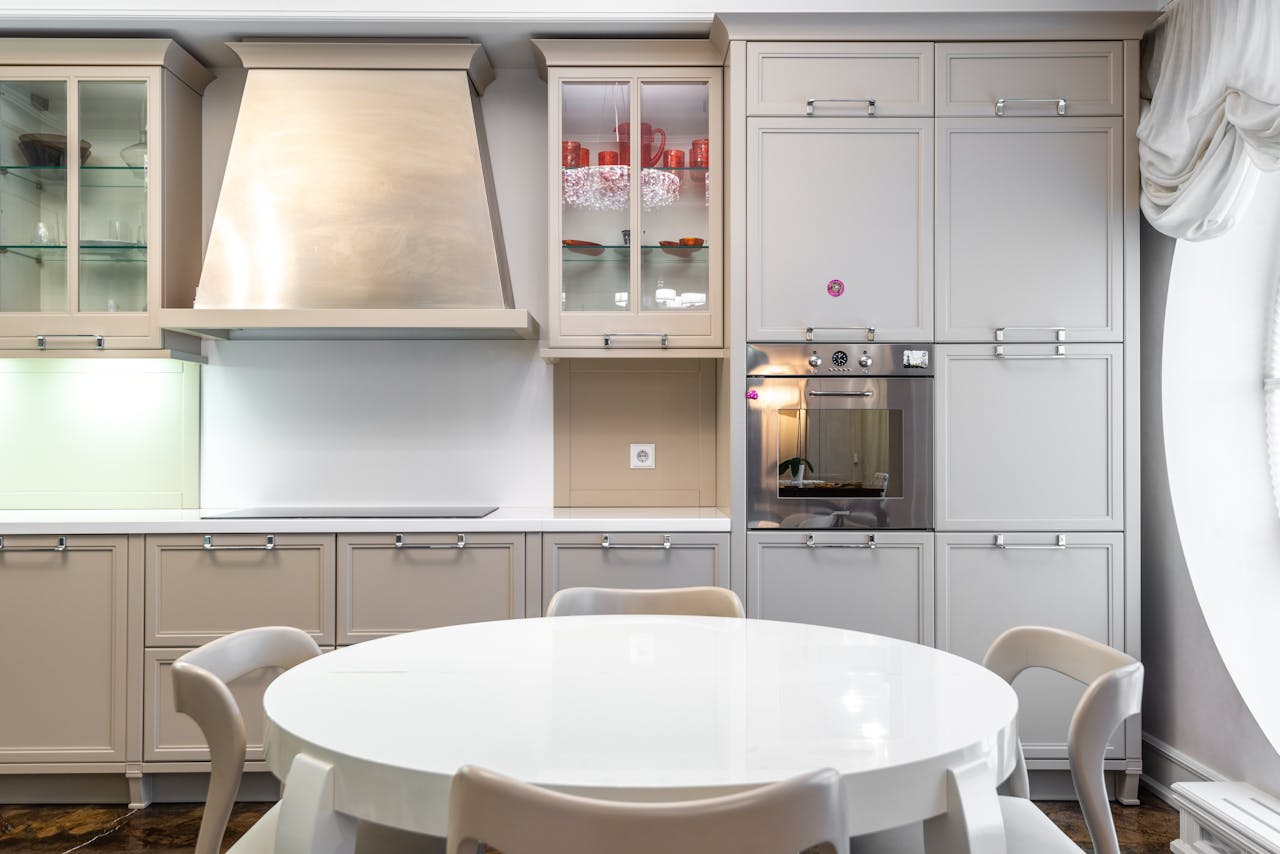German Kitchens: Precision Design That Works for Real Life

If you’ve started planning a new kitchen, there’s a good chance you’ve heard about German kitchens. Their reputation for precision, quality, and stylish functionality is well established—but what’s behind the label? Why do German kitchens dominate so many showrooms across the UK? And what exactly can you expect when you visit one?
Here, we take a closer look at what makes German kitchens so consistently sought after, and why spending time in a dedicated showroom is an essential part of your kitchen journey.
What Defines a German Kitchen?
It’s not just about geography. A German kitchen is built with a particular set of standards in mind—think strong lines, smart layouts, and engineering that works as beautifully as it looks. Manufacturers such as Nobilia, Schüller, Leicht, and Next125 are known for their factory-built units, made-to-order for each customer. That means everything fits together exactly as it should, down to the last corner post or integrated bin drawer.
There’s a notable focus on precision and quality control at every stage of production. German manufacturers often operate highly automated facilities where each component is checked, assembled, and finished under strict conditions. You’re not buying off-the-shelf furniture. You’re selecting a carefully constructed product that’s designed to work hard and last.
But German kitchens aren’t just about neat lines and clever hinges. The best ones reflect how you actually live—combining understated design with practical choices that make cooking, storing, and socialising feel effortless.
Why Visiting a Showroom Matters
You can browse glossy brochures and scroll through Instagram reels, but nothing compares to walking into a well-designed kitchen showroom and experiencing the layout, textures, and motion of the space for yourself.
Take Nobilia German Kitchens by Square in Sheffield, for example. Their dedicated showroom gives you more than just a visual. You can open drawers, test out corner units, feel the grain of a textured matt door, and speak directly with experienced designers. It’s here that the difference between a standard display and a professionally planned German kitchen becomes obvious.
The flow of a kitchen—the spacing between key areas, the weight of a drawer, the positioning of appliances—cannot be judged from a screen. A visit to a showroom helps you make informed decisions, not just about the look you want, but how your kitchen will function day to day.
Precision Is More Than Just a Buzzword
German kitchen companies are known for manufacturing with consistency and care, but the benefits go deeper than neat joins and handleless profiles. There’s a practicality that runs through the design process that suits real life.
Many German kitchens are built with a modular structure, which allows flexibility when designing around your space. Whether you’re dealing with uneven walls in a Victorian terrace or planning a sleek new-build layout, these modular elements make it easier to tailor a layout that works without compromising on looks.
The best companies combine this engineering with exceptional customer service. Square German Kitchens in Barnsley is a perfect example. They offer kitchens by leading German manufacturers, carefully matched to your needs, and designed to offer long-lasting quality. From compact kitchens to large, open-plan designs, they specialise in helping customers make the most of their space.
Designed to Be Lived In
One of the major misconceptions about German kitchens is that they’re purely minimalist or ultra-modern. While they do excel at clean lines and contemporary finishes, there’s a huge variety of styles available—from soft matt neutrals and wood-effect finishes to industrial concrete looks and warm colour palettes.
It’s this adaptability that keeps German kitchens so relevant. Whether you’re after something bold and architectural or a warm, practical space that feels calm and organised, German kitchen brands offer the breadth of finish, layout, and storage options to make it happen.
They’re also smart. Features like internal drawers, integrated waste systems, soft-close technology, pull-out larders, and hidden lighting aren’t just extras—they’re part of the standard design approach.
It’s About How It Feels to Use
There’s something quietly impressive about a kitchen that simply works. Where everything has its place. Where the doors feel weighty and silent. Where the flow between cooking, prepping and entertaining feels natural. That’s what a great German kitchen delivers. And when it’s planned by experts who understand your home, lifestyle, and layout, it can transform the way you use the space entirely.
But you won’t know what you’re missing until you experience it. That’s why stepping into a specialist showroom is such a vital part of the process. It’s not about pressure—it’s about clarity. You’ll see how drawers glide. You’ll spot details you’d never notice online. You’ll discover finishes that didn’t show up on the swatch. Most importantly, you’ll get expert advice from people who understand not just the products, but how to match them to your priorities.
What to Ask When You Visit
Not all German kitchens—or kitchen showrooms—are created equal. When you visit, keep these questions in mind:
- Are the units rigid or flat-packed? (German kitchens are usually factory-assembled for greater strength.)
- Is the service design-led or sales-driven? You want thoughtful planning, not quick fixes.
- Do they offer a free design consultation? Reputable companies often do.
- What ranges and brands are available? Ask about manufacturers, construction details, and customisation options.
- Can you see working appliances? Some showrooms include live cookers, extractors or boiling water taps to demo functionality.
- What about aftercare and fitting? A good kitchen is only as good as its installation and support.
Small Details That Make a Big Difference
German kitchens are full of small, considered touches that elevate the everyday. Drawer organisers that make your utensils easier to grab. Seamless joins that prevent crumbs from hiding in hard-to-clean gaps. Tall units that maximise awkward alcoves. Soft lighting under cabinets that’s functional as well as atmospheric.
These aren’t features for show. They’re practical additions that support how you move through your space.
You might not notice these straight away—but once you’ve lived with them, you won’t want to go back.
Why Choose a German Kitchen?
You’re not buying into hype—you’re investing in a product that’s been refined, engineered, and tested to suit busy, modern lives. Whether you want a minimalist space with built-in tech or a more natural, tactile kitchen that’s warm and welcoming, German kitchens give you the structure and flexibility to achieve it.
With the right designer and the right support, you’ll get more than just a look you love. You’ll gain a kitchen that performs. One that’s built to last, easy to live in, and tailored precisely to your priorities.
Final Thoughts: Don’t Settle for Guesswork
It’s tempting to research online, pick a style, and hope everything will come together. But if you’re serious about getting a kitchen that works—really works—it’s worth slowing down and exploring your options in person.
Visit a reputable showroom. Take the time to speak with a designer. Open every drawer. Try every layout. Ask the awkward questions.
If you’re in or around Sheffield, Nobilia German Kitchens by Square is well worth a visit. Their dedicated showroom space and expert team will help you understand the real difference a professionally designed German kitchen can make.
Planning a kitchen is a big decision. Make sure it’s an informed one—by starting with a showroom that focuses on design, not just display.




